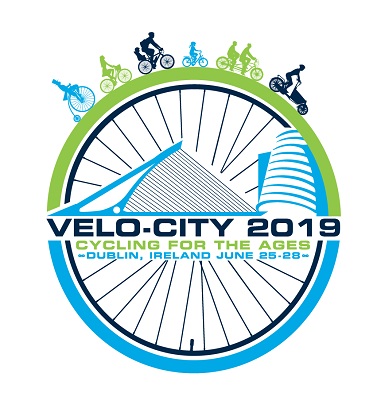Velo-city 2019 discusses policy, tech, infrastructure & cities of the future
Velo-city 2019 has officially closed its doors in Dublin after three days of seminars and discussions on key cycling topics, issues and initiatives.
Under the conference’s main theme, ‘cycling for the ages’, the summit hosted seven plenary sessions, 80 parallel sessions and over 250 speakers.
The conference was divided into six plenaries each focusing on a different key and timely issue. Plenary one focused on ‘The City of the Future’, while plenary two went on to discuss whether policy is catching up with tech development. Plenary three detailed the importance of being happy and healthy, followed by plenary four which explored the journey of infrastructure from the ‘city to the greenways’. Plenary five focused on cycle tourism and Plenary six honed in on the importance of partnership and collaboration, before plenary seven rounded off the conference with a look at the ‘City of Today.’
Policy & tech
The first day of Velo-city Dublin concluded with a discussion asking how can regulations cope with the disruptions caused by the new mobility options that keep suddenly appearing in the transport sector?
Ryan Rzepecki, CEO of Uber’s JUMP, opened the plenary giving an overview of the challenges disruptive mobility options and business models can bring to cities. He was joined by Christophe Nadjdovski, Deputy Mayor of Paris and President of the European Cyclists’ Federation, who said: “Free floating bikes and e-scooters can help shift people from their cars onto more sustainable vehicles, but too often cause a problem of occupation of public space. We need a frame. We need a national regulation.”
Karen Vancluysen, Secretary General of the Polis network, shared this view: “I see a lot of potential but I also see the major challenges in this area. The key is in the dialogue, we need to find new ways of cooperation. Cities are in charge of urban space and need to be empowered by other levels of governance to take the necessary measures to cope with this fast evolving environment.”
The session’s speakers went on to discuss how policy and legislation requires more time than product deployment, and how both local and national governments are struggling to keep up with the pace of new mobility options and technologies.
Infrastructure
Day three of Velo-city 2019 began with a plenary on ‘Infrastructure from the City to Greenways’ which was kicked off by Burkhard Stork, Executive Director of the German Cyclists’ Association ADFC who stated: “Infrastructure is the backbone of cycling development” and proceeded to discuss the popularity of vehicular cycling.
Xavier Brice, Sustrans CEO, presented the work the organisation has been doing in the UK on Paths for Everyone, and echoed the previous speakers in saying that the narrative of vehicular cycling favours risk-prone cyclists.
Dr Jennifer Dill, a Professor of Urban Studies and Planning at Portland State University, made the case for comfortable bicycle infrastructure: “To increase cycling for transport we have to build protected bike lanes and bike boulevards” and noted that “bike infrastructure in an unsupportive environment will not work.”
Selected results of the CHIPS project were also presented in a dedicated seminar at the conference. The CHIPS project (Cycle Highways Innovation for smarter People, transport and Spatial planning) has been three years of knowledge sharing and research between partners from Belgium, the Netherlands, Germany, Denmark and the UK.
The results included tips on branding, an investigation into cyclists’ positioning in relation to road markings, and feedback on infrastructure developments in the form of video footage, interviews and physical measurements such as heart rate and skin conductivity to determine stress.
Cities of the future
The final session of Velo-city 2019 looked at the ‘city of today and how it should evolve into the future of tomorrow.’
Raluca Fiser, Vice President of ECF and President of the World Cycling Alliance, said: “We have to prioritise living in the city, not driving. It’s not about how many vehicles we have, it’s about what kind of human environments we want to build and live in. We are moving in the right direction, we cannot afford to lose this momentum.”
This view was echoed by Janez Koželj, Deputy Mayor of the City of Ljubljana and host of Velo-city 2020, who spoke about the big changes he believes will happen in the future: “I am an activist of sharing. I want to see cities where we share space, vehicles, buildings. Ljubljana is transforming to adapt to this model and create multi-purpose spaces for cohabitation.”
The Lord Mayor of Dublin handed over the Velo-city bike-baton to Koželj, ending the 2019 conference. The next edition of Velo-city will take place in Ljubljana in 2020.


